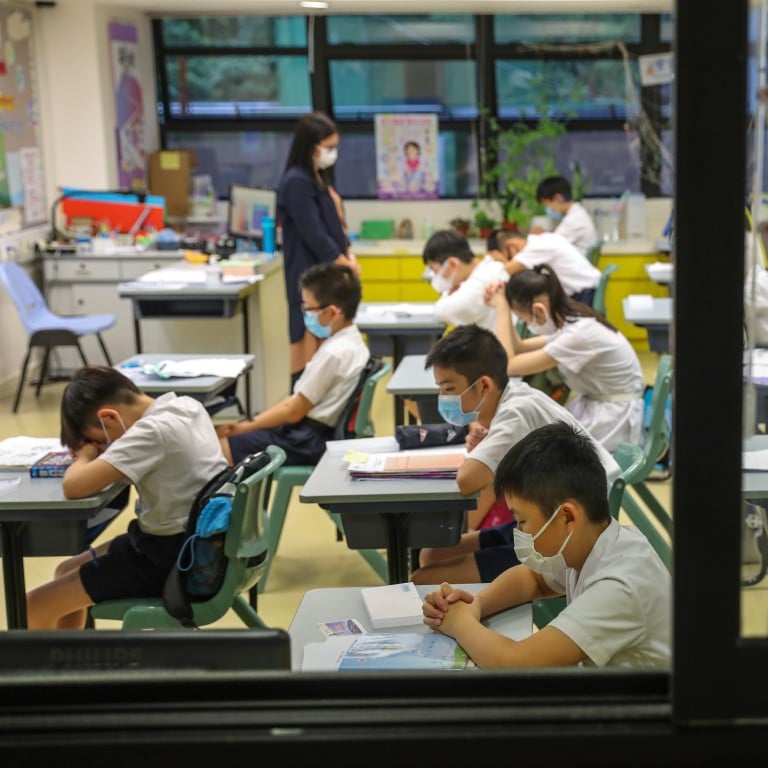
International schoolteachers on the future of education, from pandemic-era online lessons with Zoom and Google tools, to AR and VR – and the importance of social skills and empathy too
- Experts from Hong Kong’s Nord Anglia International, The Harbour School, Wycombe Abbey School Hong Kong, Caritas Wu Cheng-chung Secondary and Victoria Shanghai Academy all weigh in
- Principal Au Hoi-kin highlights professor Michael Fullan’s ‘6 Cs’ – students’ critical thinking, creativity, collaboration, communication, citizenship and character
The future of education matters for the whole planet. How can we tackle the gravest issues facing humanity if we don’t have the sort of education that helps our children develop the essential skills those issues will demand? Even if we take a step back from the macro level, it is vital to consider how to prepare students for jobs that do not yet exist, to tackle societal challenges we can’t yet imagine, and to make use of technologies that have not yet been invented.
If it is the task of teachers to prepare our children for the future, what does the future of education itself hold? We asked some of Hong Kong’s top international educators for their thoughts on the most important issues in teaching today.

The lasting impact of Covid-19
Naima Charlier, Director of Teaching & Learning, Nord Anglia International School: One of the big positives has been students’ own improved confidence and independence. They’ve really stepped up. Older kids have become super tech literate in terms of using technology to support their learning. It’s also become really clear how we do online schooling now; everybody knows what to do. Teachers are creative when it comes to online classrooms – their ability to use technology as an aid, to support how children are learning – and students know how to engage and enter learning in an online environment. We’ve got many ways now to deliver a different kind of pedagogy.
Christine Greenberg, Principal, Prep & Primary, The Harbour School: Education is one of those very extremely traditional practices that doesn’t change for 100 years. It took a pandemic to shift us. I would distil the big changes down to two points: we had to ask ourselves, what is a school? What do we need in a school? And what can a school look like when we’re not all sitting at desks and chairs in the same building? Second, what are you doing and is it worth it? And what is worth the time? So for instance, do you need teachers in school? Do you need them in from 8am to 4pm everyday, or can they work from elsewhere? It’s about taking everything off the table and only putting back what’s valuable.
Howard Tuckett, Headmaster, Wycombe Abbey School Hong Kong: Clearly technology in terms of communicating lessons has taken a huge leap forward due to lock-down requirements. Many schools have improvised their own systems; simultaneously major commercial operators like Zoom refined, improved and adapted their platforms remarkably quickly to make them suitable for schools to use. And there has been a notable increase in appreciation on the part of all members of the education community: students, parents and teachers. It is true to say the privilege of being able to physically attend a school is no longer an everyday fact of life that goes unnoticed.

The use of technology
Charlier: Technology has helped students to take ownership of their learning. It has helped drive student agency – the idea that students have a say in how they learn, what they learn and when they learn.
AI will be a big change going forward. It will help teachers personalise learning. As a teacher it can be quite hard to keep hard to keep track of what stage every learner is at, at every moment, which is the ideal. AI will help by capturing how students feel about what they’re learning, whether they truly understand it, and can they demonstrate it – teachers can then see any gaps and teach to those gaps.
Greenberg: Google and Zoom have both amped up their services and should see continued use. A lot of big companies that were aimed at adult meetings changed their tech so kids could use the programmes and teachers could respond in live time. One of the challenges of online learning was you could have a kid playing a video game at home. They might be on camera, but you don’t necessarily know what they’re doing. Things like Google Suite allowed you to ask students to work on a document and you could see if they were all typing. So these companies really rose to the challenge of showing students were showing active engagement. Technology has helped students to take ownership of their learning. It has helped drive student agency – the idea that students have a say in how they learn, what they learn and when they learn.
Tuckett: I think Augmented Reality and Virtual Reality will start to be further developed and in time, become meaningfully supportive technologies for education.
My observation has been that the implementation of both technologies got off to a false start at the start of this decade. This was because both technologies are deeply embedded in the games industry. I believe entrepreneurial spirits in that industry tried to make some quick adjustments to existing games scenarios and rebrand them as educational tools. This attempt was mostly overwhelmed by the impact of Covid-19 across education and the shifted focus on the conference/meeting technology required to support online learning.
As we return to the day-to-day schooling model, I hope to see a dedicated and focused return to investigating how these two amazing graphic technologies could be seriously utilised to support learning.
The art of being human is what’s going to be what’s important. We can’t do without knowledge, but empathy, problem solving – these are the sorts of skills that will be key
Updating syllabuses and curricula
Charlier: Over the next 30, 40 or 50 years there are very few professions that will not be outpaced by computers. The art of being human is what’s going to be what’s important. We can’t do without knowledge, but empathy, problem solving – these are the sorts of skills that will be key. And how and when children learn these sorts of skills, that these things can be taught and examined – I think what’s shifting is the belief that we can measure if someone is more creative than at the start of the year or whether they are more empathetic.
Au Hoi-kin, Principal, Caritas Wu Cheng-chung Secondary School: In a globalised world, people are more mobile. While still recognising the needs of any local society, syllabuses and curricula must attach importance to the integration of students across the world. Hence, a set of “glocalised” curricula will be the core of our future education.
Syllabuses and curricula also need to undergo a paradigm shift from a knowledge-based mindset to a skills-based one. The Framework for 21st Century Learning should serve as significant reference for educators. In addition to cultivating students’ global vision, we focus on Professor Michael Fullan’s “6 Cs” – developing students’ critical thinking, creativity, collaboration, communication skills, citizenship and character development.
Greenberg: If you’re at a good school, I think the curricula should be being adapted on an ongoing basis. I would expect curricula to change every year – not in a grand scheme, I don’t think everyone will change what they’re going every year – but leaders should always be saying, how are we making this relevant for our students?
For instance, literacy should evolve beyond reading and writing, or typing. We need to make our kids proficient in multimedia, they need to communicate by video. That means making them think about not only what they’re reading and writing but about camera angles, about lighting, how to keep their viewers engaged. Video is not just a frivolity anymore.
Tucker: Trends in teaching curriculums come and go. Such trends tend to be circular. The same aspects come in and out of favour every few years or so. This is a healthy thing to some extent, as it indicates that educators really are constantly reflecting on what they are teaching and are constantly adjusting the syllabus, striving for the optimum efficiency in learning.
I believe that we will see an ever- increasing leaning towards technology in the curriculum. This must happen. We are told that the amount of “knowledge”, all things there are to know in the world, doubles every five years. Almost all this new knowledge is technical information. It follows then that education, as it prepares youngsters for the workplace, will have to follow suit.
Changes in pedagogy
Charlier: Online learning has changed things but there’s still a pattern to teaching. It has changed in terms of the tools we use, but the framework remains the same. What has been developing really fast is our understanding of metacognition and how learning happens. I can teach a student how to count but if they haven’t •learned• how to count, then I’ve not been effective. So that emphasis on learning and the cognitive science that goes with it is a massive change in the last 10 years, and we have an increasingly greater understanding of it.
Greenberg: Our students still do maths tests like everyone else. But one thing we do is we tell our teachers they have to do a capstone event that mirrors a real world event. For instance, in a different school, if their unit of study is the Renaissance, a student might do a term paper on the Renaissance. What our students have to do is train fourth graders so they can host a Renaissance fair for the whole school. That is a different kind of rigour because that is an authentic exhibition of what they’ve learned.
Tucker: I do not anticipate that we will see any seismic shift in how good teaching takes place, but I have noticed and am immensely encouraged by the advanced capabilities of newly qualified teachers coming into the teaching ranks.

I qualified as a teacher in 1983, after four years of content-focused training. I knew everything I had to teach across a dozen subjects and across five year groups in terms of substance and had some teaching delivery skills. However, modern teacher training is much more focused on the science of the actual teaching and delivery of learning skills. Content knowledge is still high, but the delivery and pupil empathy skills evidenced by more recently trained teachers are very impressive. I am massively encouraged about the outlook of the quality of teaching skills for the future.
Developments in mental health and well-being
Greenberg: Hopefully schools have been prioritising mental health and well-being outside of Covid, but one thing we have capitalised on is relationships and rapport and being respectful. This shouldn’t be anything new because if you’re in a workplace where you feel like you matter, that your boss sees you and who you are, then you perform better as an employee. It’s the same for students. For many schools it’s unfortunately still only about, are you a great mathematician, or are you great at reading and writing? As with video literacy, what you want is a school that has an expanded notion of what is a great or successful person – and that will be even more important in the future.
Tuckett: The current levels of pupil depression and anxiety-related issues in schools around the world are unsustainable. An education system that creates the pressures of modern formal assessment-based education must take some responsibility for this pressure, and constantly seek ways to assist our emerging youngsters with how they can channel work-related stress, and take care of themselves and those about them.
I strongly feel (and hope) that we have proved the limitations of formal examination-based education. It would be a very lazy education community indeed that allowed this system to drag on just because it is easier not to upset the status quo.
In this technologically enriched world, there must be a better model to offer our pupils. We must be able to develop a healthier educational trajectory that still assesses learning and competencies, but that avoids the massive spikes of pressure and unnecessary anxiety with its attendant threat to the mental health of our young people.
Thomas Woods, deputy principal, designated safeguarding lead (DSL), Victoria Shanghai Academy: Building awareness of mental health and well-being is crucial. Educating students to recognise symptoms and causes that help or hinder their well-being is vital and to know how to deal with issues that may arise. Equipping students with the necessary well-being literacy enables them to emotionally express themselves and importantly, know how to ask for help (if necessary).
Students’ mental health and well-being will receive more attention. The epidemic has changed the order of the world, and students’ resilience is ever more important. Schools need to design mind-related activities such as meditation and mindfulness practice. To foster students’ mental health, character education is an indispensable part. They need to have a stable outlook on their own life despite tremendous changes in the world.
While learning about AI and the application of technology, students must learn to develop soft skills such as empathy, creativity and problem-solving to effectively use technology and improve human well-being
The importance of soft skills
Au: Technology can make life more efficient, but soft skills help build the humanities of students. In the future, the world will face such problems as an ageing population, environmental deterioration, food crisis, etc. While learning about AI and the application of technology, students must learn to develop soft skills such as empathy, creativity and problem-solving to effectively use technology and improve human well-being. They need to view important issues from the environmental, social and governmental perspectives. Most importantly, they need to embrace ethics, learn to serve with the technological knowledge they have acquired, but not to be served.
Charlier: Soft skills are universal and STEAM subjects are really important for the future. We will need problem solvers and that is what those subjects are about. But being better at being human, getting on with people, building bridges and relationships – that will help you no matter what you’re doing. You can get your PhD at Cambridge but if you can’t get on with your colleagues or they don’t want to work with you, then you’re not going to have a richer life experience compared to those students who do develop more well-rounded outlooks.
Tuckett: I will share a story of one of my brothers-in-law who works for a significant IT company. Many years ago, he was part of the team who invented the concept and commercial viability of The Cloud. His career success was assured at that point because, despite the brilliance of all the other members of the team who developed this technology, he was one of the few who could really explain the concept of The Cloud and its potential.
So social intelligence, empathy and communication skills are always going to be equal to technological skills if we are going to share concepts and enhance their potential with each other. School curriculums should always reflect that very human reality.

